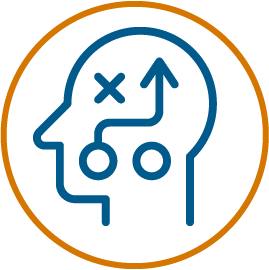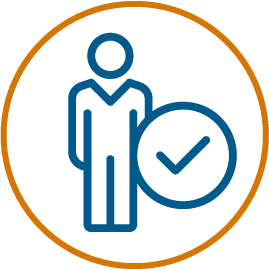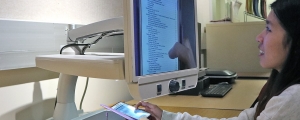Gain the skills to assist individuals with visual impairments to become safe, efficient, independent travelers.
Program Type
Graduate Certificate
Semester Start
Summer
Study Options
Online
Minimum Duration
1 Year
UMass Boston’s Orientation and Mobility Certificate focuses on training professionals to assist blind or visually impaired individuals to reach their goal of becoming safe, efficient, independent travelers. It’s designed for teachers and other professionals who want to work with people with visual impairment and help them lead safe, productive and independent lives. You’ll gain the skills necessary to evaluate needs of adults and children with visual impairments. You’ll also learn how to teach them how to use equipment, such as the long cane, and low vision aids, as well as the integration of a professionally trained dog guide so they may orient themselves and travel safely with confidence. Explore cutting-edge learning technologies and gain practical hands-on experience through fieldwork. Apply these skills to assist people of all ages in different settings — from state and federal agencies to public and private schools.
This program prepares you to sit for national professional exams through the Academy for Certification of Vision Rehabilitation & Education Professionals.
You have the option to continue on for an additional two semesters to earn a full Vision Studies MEd with a concentration in Orientation and Mobility.
Tuition
- This program consists of four 3-credit courses and four 4-credit courses, or 28 credits.
- Teachers of the Visually Impaired may be eligible to complete the certification program in 19-25 credits.
- Each course is $1,401.
- Total estimated tuition cost to complete this program is $7,000 - $13,076, depending on number of credits needed to complete the program.
- Other fees may apply. Request Info to connect with a program representative for further details.
*This certificate can be completed in one year, but can take up to 2 years if you do not have vision background.
Deadline
Summer Deadline: March 1
Application Checklist
- Online Application — Applicants are accepted into the O&M program once a year, for the summer semester only. Application deadline is March 1. Specify that you are applying to the Orientation & Mobility certificate.
- Transcripts — Official transcripts from all undergraduate and graduate institutions attended. A 3.0 undergraduate GPA is required.
- Three Letters of Recommendation — Use the forms provided by the Office of Graduate Admissions. Emphasis should be on academic and professional references.
- Test Scores: GRE, MAT, or MTEL — If you do not have a master’s degree, you will be required to take the Graduate Record Examination (GRE), Miller Analogies Test (MAT), or Massachusetts Test for Educator Licensure (MTEL).
- Statement of Interest and Intent (Required Writing Sample) — Submit a two-part essay:
- Explain your reasons for wishing to pursue graduate studies (approximately 300 words).
- Indicate your specific interest in Orientation & Mobility and discuss the type of work you would like to do in this field (at least 1,200 words).
- This statement will be reviewed for both your overall message and your ability to write at the graduate level. Proofread your writing carefully; it is ranked according to its clarity, grammar, and syntax.
- Personal Interview with Faculty Member — When the Office of Graduate Admissions has notified us of your completed application, we will contact qualified candidates to arrange an interview (either in person or via teleconference).
- International Applicants Only — TOEFL Test Scores
- Physical/Functional Aspects of Visual Impairments (VISN 601)
Get an introduction to the structure and function of the main systems of the human body and to those chronic conditions which may affect these systems. Emphasis is placed on disabilities most frequently seen in conjunction with visual impairments and how the combined impact will affect instruction for individuals with vision impairment. Having covered these areas, you’ll explore each of the sensory systems with the mechanics of locomotion and psychomotor factors influencing mobility. - Braille I (VISN 603)
Become prepared to teach the reading and writing of Grade 2 Braille. You’ll learn how to write literary Braille using both a Perkins Brailler and a slate and stylus. You’ll explore topics including reading-readiness, tracking, tactile discrimination, and reading methods. - Visual Functioning (VISN 604)
Get a practical look at the functional impact of visual impairment through the use of simulated exercises. The course includes a series of medically related lectures by affiliated ophthalmologists covering various topics, including the structure of the eye, the assessment of normal and abnormal vision, optics, and the functional implications of common pathologies. You and your fellow students will discuss low-vision services and participate in ''hands-on'' training within a low-vision clinic. - Implications of Low Vision (VISN 605)
This course goes beyond the physical aspects of vision loss to look at functional and psychological aspects. You’ll review clinical procedures and the interpretation of clinical reports with an emphasis on conducting individualized functional vision assessments. You’ll apply previous study of optics to optical low-vision devices. In this course, you’ll get a practical, hands-on approach to learning through vision-simulation activities and the development of a functional vision-assessment kit. - Methods of Orientation & Mobility (VISN 625)
Examine the foundations of learning and teaching orientation and mobility. The weekly lectures provide you with an introduction to the principles of concept development, spatial orientation, and environmental analysis as these topics relate to independent travel by visually impaired individuals. In addition, a teacher-guided practicum lab meets for weekly sessions, totaling 120 hours throughout the semester. - Orientation & Mobility Assessment Strategies: Children (VISN 621)
This course is the first of two instructional strategy courses. You’ll apply foundations and methods to the specific populations of preschool, elementary, and transition-age visually impaired children, including those with additional disabilities. Assessment tools are introduced and applied with an emphasis on developing your skills in observation, information gathering, and task analysis. You’ll develop specific objectives and design lessons for instructing children. This course requires an additional minimum daytime participation of six to eight hours per week to acquire 80 hours of instructional experience. - Orientation & Mobility Assessment: Adults (VISN 622)
This is an instructional strategies course which applies foundations and methods to the specific populations of visually impaired adults, including persons over age sixty-five, those with additional disabilities, and persons of diverse cultural backgrounds. Case studies provide you with the basis for discussion and foundation to the practical experience provided in the O&M Internship. Assessment, observation, information gathering, and task analysis through lesson design are critical elements of this course, while the advanced systems of O&M are addressed in greater depth. - Practicum in Orientation & Mobility (VISN 629)
You’ll participate in a full-time or part-time internship. As part of your internship, you are required to keep an on-going diary of your experiences along with a capstone portfolio. You must complete the clinical requirements set by AERAC and ACVREP, totaling a minimum of 350 hours. You’ll also prepare for the International ACVREP application and examination for certification. This course is for students who have completed course work and all pre-practicum hours with both children and adults.
At the end of this seven-month program, you’ll be awarded a certificate in Orientation and Mobility. The certificate will demonstrate your expertise in the field on your résumé, as well as in interviews and workplace evaluations. Upon completion of the program, you will be prepared to sit for the national professional exam through the Academy for Certification of Vision Rehabilitation & Education Professionals. You also have the option to continue on for an additional two semesters to earn a full Vision Studies MEd with a concentration in Orientation and Mobility.
Why UMass Boston Online?
Value
Among the lowest online tuition rates of an accredited, public research university.
Flexibility
Study full-time to finish fast, or part-time to suit your schedule. Live sessions scheduled with the working professional in mind.
Authenticity
The same courses taught by the same academic departments as on campus. No third-party providers.
Learn More






